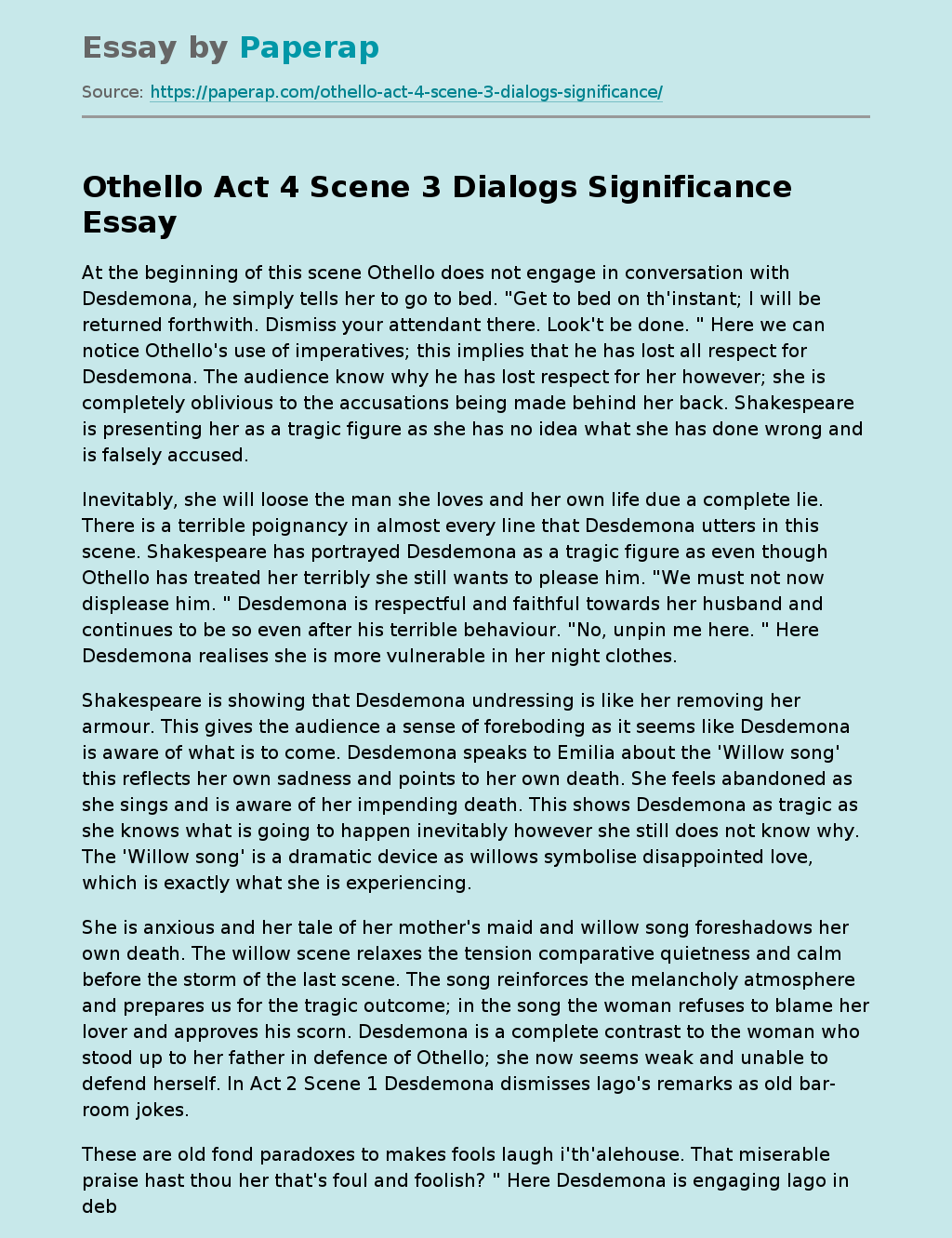Othello Act 4 Scene 3 Dialogs Significance
At the beginning of this scene Othello does not engage in conversation with Desdemona, he simply tells her to go to bed. “Get to bed on th’instant; I will be returned forthwith. Dismiss your attendant there. Look’t be done. ” Here we can notice Othello’s use of imperatives; this implies that he has lost all respect for Desdemona. The audience know why he has lost respect for her however; she is completely oblivious to the accusations being made behind her back.
Shakespeare is presenting her as a tragic figure as she has no idea what she has done wrong and is falsely accused.
Inevitably, she will loose the man she loves and her own life due a complete lie. There is a terrible poignancy in almost every line that Desdemona utters in this scene. Shakespeare has portrayed Desdemona as a tragic figure as even though Othello has treated her terribly she still wants to please him. “We must not now displease him.
” Desdemona is respectful and faithful towards her husband and continues to be so even after his terrible behaviour. “No, unpin me here. ” Here Desdemona realises she is more vulnerable in her night clothes.
Shakespeare is showing that Desdemona undressing is like her removing her armour. This gives the audience a sense of foreboding as it seems like Desdemona is aware of what is to come. Desdemona speaks to Emilia about the ‘Willow song’ this reflects her own sadness and points to her own death. She feels abandoned as she sings and is aware of her impending death.
This shows Desdemona as tragic as she knows what is going to happen inevitably however she still does not know why. The ‘Willow song’ is a dramatic device as willows symbolise disappointed love, which is exactly what she is experiencing.
She is anxious and her tale of her mother’s maid and willow song foreshadows her own death. The willow scene relaxes the tension comparative quietness and calm before the storm of the last scene. The song reinforces the melancholy atmosphere and prepares us for the tragic outcome; in the song the woman refuses to blame her lover and approves his scorn. Desdemona is a complete contrast to the woman who stood up to her father in defence of Othello; she now seems weak and unable to defend herself. In Act 2 Scene 1 Desdemona dismisses Iago’s remarks as old bar-room jokes.
These are old fond paradoxes to makes fools laugh i’th’alehouse. That miserable praise hast thou her that’s foul and foolish? ” Here Desdemona is engaging Iago in debate. She is standing up for herself and what she believes in; this is tragic as the audience can see a clear change in Desdemona’s personality. “Let nobody blame him; his scorn I approve – Nay, that’s not next. Hark, who is’t that knocks? ” Here Desdemona has added a line to the song suggesting that she is nervous and on the edge.
Emilia and Desdemona continue to talk and they are discussing the act of committing adultery, Desdemona says she would not do such a wrong thing. Emilia argues that men’s treatment of their wives is often the cause of women’s ‘falling’. She states that women have desires and weaknesses just as much as men. Men should beware or women will learn from how they are abused to abuse them. However, Desdemona perseveres in her view and shows Emilia and the audience that she would rather learn to improve from, rather than copy and abuse.
Here we see the complete contrast in characters. Desdemona is completely faithful to Othello which makes their situation all the more tragic. Emilia does not seem phased by being unfaithful whereas Desdemona is shocked by this idea. “That there be women do abuse their husbands in such gross kind? ” She is appalled by this idea and this adds to the fact that she is completely innocent. Desdemona’s fate is unfair and unearned, yet she is the tragic female heroine who ends up being sacrificed to satisfy the fates.
Aristotle taught that ‘tragedy is composed of six elements: plot-structure, character, style, spectacle, and lyric poetry. The characters in a tragedy are merely a means of driving the story; and the plot, is the chief focus of tragedy. It is the imitation of action arousing pity and fear, and is meant to affect the catharsis of those same emotions. ‘ In Aristotle’s definition of tragedy Shakespeare has definitely portrayed Desdemona as a tragic figure. If the characters are a means of driving the story then the play wouldn’t have a plot if it weren’t for Desdemona.
Othello, Desdemona and Iago are the three main characters involved to form the plot along with others. The plot is the chief focus of tragedy therefore Desdemona is playing part in creating the tragedy for the play. S. N. Garner elucidates Desdemona’s character, maintaining that Shakespeare carefully balanced the other characters’ accounts of her as goddess or whore to present a complex portrait. Othello’s sensual view is countered by Brabantio’s idealized concept in Act 1 and Roderigo and Cassio’s romanticized vision is opposed by Iago’s coarse innuendo in Act 2.
Garner then points out that Desdemona’s liveliness and assertiveness are confirmed by her marriage to Othello and that these positive traits become a fatal. Here we can see that Garner believes that eventually Desdemona’s traits became fatal to her character. This links in with Aristotle’s definition of tragedy as he also says that their downfall is caused by a series of bad choices caused by tragic flaws in their character. This could suggest that it is partly Desdemona’s character that has increased the tragedy between Othello and herself.
Othello Act 4 Scene 3 Dialogs Significance. (2017, Aug 01). Retrieved from https://paperap.com/othello-act-4-scene-3-dialogs-significance/

